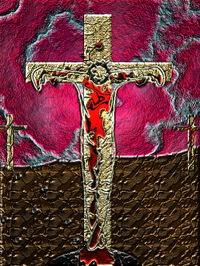 Every human being has to decide who Jesus Christ was and is. Many try to cast him as a good moral teacher, but in reality this view is either a sign of naivety since the individual must be unaware of what Jesus said, or is a contradiction since the individual doesn't actually want to believe what Jesus said. C.S. Lewis accurately lays out man's only three responses in Mere Christianity to the outlandish things Jesus claimed, that He is: a lunatic, a liar, or He is Lord. Taking Jesus at face value and believing the thins he said about Himself has created the orthodox view of Christ, which rightfully concludes the He is the Lord. Throughout His ministry Jesus Christ quietly and cryptically revealed Himself to be one (John 10:30) with the monotheistic God of creation. In addition to the Holy Spirit (Matthew 23:19), He is the third person of the Trinity – the enigmatic nature of God. Thus as the third person of Trinity, He exists as Fully God, yet as attested by Scripture, He exists as Fully Man. This paradoxical dual nature is known as the Hypostatic Union of Christ's two natures. Scripture overflows with references that Jesus Christ was fully God. First, Jesus Himself claimed to be God not only claiming to be the fulfillment of Messianic prophecies (Matthew 26:63-65), but also ascribing the holy name of God “I Am” to himself (John 10:30-33). These claims weren't lost on His original Jewish audience who attempted several times to kill Him for blasphemy (John 8:57). In addition, the Old Testament ascribes the names of God to the coming Messiah (Isaiah 9:6), Christ's disciples recognize Him as the Messiah (Matthew 16:16) and God (John 1:1, 20:28). The early church attested to His deity (Romans 9:5) and even describes Him as the physical manifestation of God (Hebrews 1:3). Furthermore, Jesus has all the attributes of the Godhead. He is shown as omnipotent, such as when He subdued wind & waves to His will (Matt 8:26). He has omniscience (John 2:25), such as His knowledge of the woman at the well's past (John 4). Jesus speaks of His Omnipresence despite His physical body (Matt 18:20, 28:20). Jesus acts and speaks with authority out of His Sovereignty, not invoking “Thus sayeth the Lord,” but “I say to you” (Matt 5:22). He references His eternal nature, telling the Jews that “before Abraham, I am!” (John 8:58), and the churches that He is the First and the Last (Revelation 1:17). Jesus is described as immutable or unchanging (Hebrews 13:8). From His attributes, Jesus is seen performing the works of God, such as creating the world (Colossians 1:16). He forgives sins (Luke 7:48), saves humanity (Acts 4:12), judges individuals (John 5:22-23), and will render the final judgment of all mankind (Matthew 10:32-33). Lastly, Jesus is treated as God and He accepts it! Jesus accepted prayer (Acts 1:24-25) and He accepted worship (Matthew 14:33, 28:9) even when Jesus Himself proclaimed that worship should be reserved for God alone (Matthew 4:10)! Throughout Scripture we also see that Jesus Christ was fully Man. As predicted by the Hebrew scriptures, Jesus had a human origin. Christ has a human genealogy that traces back through David and all the way to Adam (Matthew 1:1-16). He had a human conception (by the Holy Spirit) and a human birth (Luke 2:40-52). As a result, Jesus had a human body (Matthew 26:12), that grew from childhood (Luke 2:40), had human needs (food/water: John 4:6-7, rest/sleep: Matthew 8:24), had human emotions (love: Matthew 9:36, anger: Matthew 21:13, sadness: John 11:35, anguish: John 12:27), and experienced temptation (Matthew 4:1-11). By appearance no one mistook him for anything other than a man (John 1:30, 4:9). Jesus also has a human mind that increased in wisdom (Luke 2:52) and experienced human limits (Mark 13:32). Jesus is even shown to have a human soul (spirit) that is troubled (John 12:27) and sorrowful (Matthew 26:38). Lastly, Jesus died (Luke 23:46). The only difference between the man Jesus and the rest of humanity is that He is man as man was created to be. Jesus is the unmarred image of God that man was created in (Genesis 1:27), just as Adam and Eve were before the fall (Genesis 2:25). He lived a sinless life (Heb 4:15, 1Peter 3:18), experiencing all the temptations man faces, but emerging victoriously. Thus, He serves as the model for humanity that God had always intended for man (1 Corinthians 11:1).  Personal Art: Calvary Jesus Christ was necessarily both fully God and fully Man for our atonement. Sin through Adam and through man's own failings made him God's enemy in rebellion to the law. God's holiness and His love ensures justice, and thus through His Holy wrath judge any and all trespasses. However, in His love, God provided His son Jesus Christ to take the place of mankind and incur God's wrath on the cross to pay for all sin (Romans 5:9-10). Thus, it is necessary that Jesus is fully Man so that He could serve as an acceptable substitute for sinful man (Hebrews 2:14-17). Through His sacrificial death God provided a means of atonement so that all who accept Jesus Christ's substitution on their behalf are restored and able to enter God's presence (Romans 3:25 & 1 John 2:1-2). Just as sin entered the world through one man, so sin was paid for, once and for all, through one man (Romans 5:12 & Hebrews 10:1-4). It is necessary that Jesus is fully God not only so that His infinite and eternal nature could incur the full weight of His wrath, but also so that He might triumph over death through His resurrection. Christ's resurrection secures regeneration for man, so that we might be justified (Philippians 2:8-9) and born again (1 Peter 1:3). Power to gain more victory over remaining sin (1 Corinthians 15:17) and for ministry in the work of the kingdom results from new life in Christ (Acts 1:8). Christ's resurrection serves as a forerunner for our future resurrection and restoration of our bodies upon our own earthly demise (1 Cor 6:14). In a similar fashion, Christ's ascension foreshadows our own ascension to heaven (1 Thessalonians 4:17) where Christ has prepared a place for us and will take us to be with God (John 14:3). There, we will sit with Him in the heavenly places and share in Christ's Authority (Ephesians 2:6, 6:10-18). Jesus Christ perfects the work of the three offices of authority. Authority in the nation of Israel came from three distinct offices: prophets who spoke God's words to the people, priests who ushered the people into God's presence, and the king who ruled the people as God's representative. Jesus appeared as God's Word, the answer to prophecy and as the source of revelation (1 Peter 1:11). Jesus offered the perfect sacrifice for sin to fully allow people to come near to God (Hebrews 9:24-26). Jesus' ministry announced the Kingdom of God (John 18:36) and has been given authority over all creation and reigns as God (Revelation 19). Little room exists for disagreement on who Christ is. The apostles and the church have always recognized the importance and necessity of who Christ is, lest the atonement and subsequently our salvation fall apart. Heretical views of Christ abound. However, we must be careful not to dictate or judge what only God can know, ultimately who and who isn't saved (what of Nestorian & Monophysite Christians of Eastern Christianity?). Scripture says call on the name of Jesus and be saved, not call on the name of Jesus and understand His exact nature and His atoning sacrifice work (just as one need not know how an engine works to benefit from a car). Even so, woe to false teachers who teach other than what scripture reveals about Jesus!
0 Comments
Leave a Reply. |
AuthorBrett Yardley: Categories
All
Archives
January 2019
|

